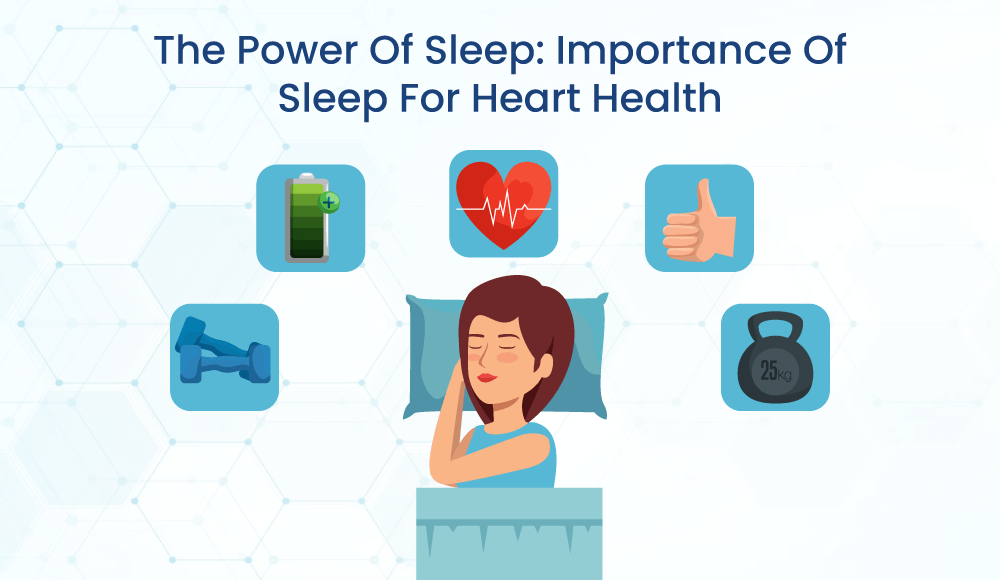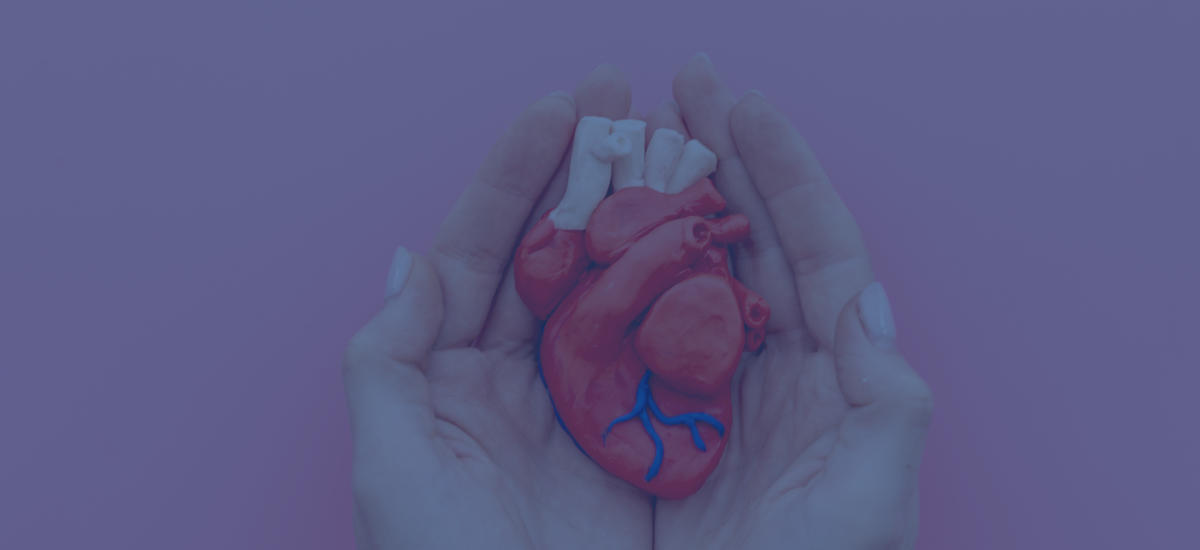We spend more than 15 hours a day awake and engaged in different kinds of activities. It is therefore necessary to prioritize the remaining 7-8 hours to get quality sleep, which can improve your overall health and well-being.
Studies on sleeping disorders suggest that 62% of adults don’t sleep as well as they’d like to. Lack of sleep can lead to several health issues, such as obesity, diabetes, hypertension, and heart disease. It is especially hard on your heart health. So, do your heart a favor and get adequate sleep!
However, if you are having trouble falling asleep and dealing with insomnia, you might need to get in touch with a doctor. You can also read about the connection between sleep and heart health in this guide and educate yourself the importance of sleep for heart health. You can also try the strategies listed in this blog to get better sleep at night.
Schedule a consultation with an expert to discuss the importance of sleep for heart health
A] The Connection Between Sleep And Heart Health
Getting high-quality sleep is important to maintain cardiovascular health in peak conditions. Someone with a history of poor-quality sleep and irregular sleeping patterns is, therefore, more susceptible to cardiovascular diseases, diseases that affect the heart or blood vessels.
- Several studies have also shown that sleep disorders are also often associated with a myriad of cardiovascular health conditions like heart attacks, stroke, high blood pressure, hypertension, and coronary heart diseases.
- The American Heart Association, are pioneers in heart disease treatment in a recent study concluded that lack of sleep significantly accelerated the risk of heart diseases by triggering diabetes, inflammation, weight gain and heart strokes.
- People that had a history of sleeping disorders like insomnia were also found to have more plaque buildup, coronary artery disease, and arrhythmias than those who received quality sleep.
B] The Benefits of Getting Enough Sleep For Heart Health
If you are someone that burns a lot of calories through physical activities, sleep and heart health are your core foundations. Finding the best way to sleep for your heart can also provide a boost in metabolism, hormones, improvement in memory and concentration, and overall quality of life.
1. Reduced Risk of Heart Disease
According to experts, your blood pressure level declines when you are asleep. However, in people with sleep disorders that are unable to get adequate sleep, the blood pressure stays higher for longer durations. High blood pressure can lead to complicated heart diseases, hypertension, and coronary artery disease. Which is why, getting enough sleep has been associated with reduced risk of heart diseases and strokes.
2. Improved Heart Function
Getting enough sleep can help keep blood pressure under check, reduce cholesterol levels, and minimize the risk of inflammation which all help improve your overall heart function. As sleep and cardiovascular health are interlinked, getting adequate sleep also promotes healthy blood vessel function, which is fundamental to a healthy heart.
3. Lowered Risk of Heart Attack and Stroke
A study on lack of sleep and heart disease found that individuals who did not get enough sleep were exposed to risks of weight gain, diabetes, inflammation, stroke, and heart attacks. Participants with adequate sleep were found to have a lesser risk of heart disease.
4. Better Management of Cardiovascular Risk Factors
When you get quality sleep, your blood pressure goes down, your metabolism picks up, you get a boost of hormones, and your quality of life improves. This will ultimately improve your cardiovascular system and prevent you from becoming obese or having high cholesterol levels, thereby minimizing cardiovascular risks.
5. Improved Mental Health
Typically your brain activity fluctuates, slows down and speeds up when you are asleep. During rapid eye movement (REM) sleep, the brain starts processing emotional information, and these appear to us as dreams. This positive emotional content can help you reduce stress and anxiety, which correlates to better heart and mental health.
6. Improved Quality of Life
When you are sleep deprived, you always feel tired, with zero motivation to do anything. This is unhealthy and does more harm than good, whereas, with adequate sleep, you wake up fresh with a burst of energy necessary to perform daily tasks without fatigue dragging you down.
C] Strategies for Improving Sleep Quality
Setting up a consistent sleep routine is the first step in improving sleep quality. However, to ensure better sleep and cardiovascular health, you need to first create a sleep-conducive environment that offers an ambient setup to fall asleep.
1. Consistent Sleep Schedule
Creating a sleep schedule is easy, but making sure you stick to the sleep schedule by going to bed and waking up at the same time every day, even on weekends, requires a lot of conscious effort. Keep working until your body makes a habit of it, and this becomes your daily routine.
2. Sleep-Friendly Environment
Our mind and body switch off when we sleep. An ideal sleep-friendly environment, therefore, needs to be a place that has ambient temperature and is quiet and dark. This will help you sink into the realm of sleep in a much more efficient way.
3. Regular Exercise
Sleep and cardiovascular health go hand in hand with one another. When you get adequate sleep, you have more energy, and by combining this with a consistent sleep routine, you can make regular exercise a habit. Because you expend energy on exercise, you will fall asleep much easier as well.
4. Healthy Eating Habits
Consuming the right food and cultivating healthy eating habits are key to improving your heart. You should also stay clear of large meals late at night and reduce caffeine intake. If you are unsure about what food to have, here are 15 heart-healthy foods that you can eat wholeheartedly.
5. Stress Management
Life can throw a lot of mental stress at you and this can significantly deteriorate your sleep quality and heart health. That’s why you need to learn stress management to stay clear of sleep deprivation and heart disease. Consider mastering yoga, meditation, and deep breathing techniques to manage your stress and stay composed.
6. Technology Use
Technology has invaded life like never before, so much so that life without a smartphone or digital gadget is unthinkable for most people. However, many people forget or disregard the fact that technology can significantly impact your sleep cycle. That’s why you need to avoid electronic devices that emit blue light and interfere with the quality of your sleep.
7. Sleep Aids
If you wake up at the slightest disturbance, you should invest in sleep aids. These sleep aids can help you get better sleep by masking noise. Noise-masking devices like white noise machines, and earplugs, along with light-blocking aids like eye masks, are some of your best options.
8. Medical Consultation
If you are experiencing ongoing sleep problems or have a history of heart disease, it is best to get a medical consultation from the best cardiac surgeon in Mumbai. Get first-hand information about the importance of sleep for heart health and overcome your struggles instantly.
Schedule a consultation with an Expert to discuss the importance of sleep for heart health
Conclusion
Quality of sleep and cardiovascular health are interlinked in such a way that it’s impossible to improve one without improving the other. We hope our guide has helped you seek the guidance you need for your sleep issues.
You can also seek professional medical experts to get help with sleeping disorders and heart diseases. To find out if your sleep issues are affecting your heart health, we encourage you to get in touch with reputed cardiac or heart transplant surgeon in India, with a proven track record and years of expertise.





[…] Perceive the importance of sleep for a healthy heart, […]
[…] of undisturbed sleep per night to support heart function and reduce cardiovascular risks, as the importance of sleep for a healthy heart is […]
[…] relaxation techniques like meditation or yoga. Prioritise sufficient sleep to reduce stress, as the importance of sleep for a healthy heart is […]